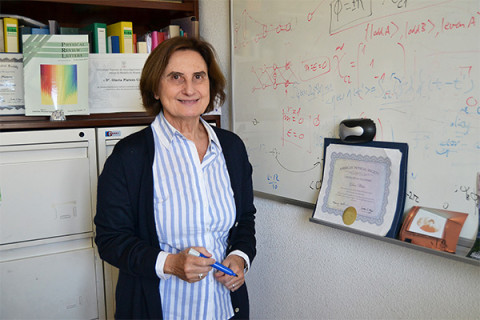Gloria Platero, ICMM-CSIC researcher, awarded with the 2023 EPS Emmy Noether Distinction for her full career

Gloria Platero, a Research Professor at the Material Science Institute of Madrid (ICMM), part of the Spanish National Research Council (CSIC), has been awarded with the 2023 EPS Emmy Noether Distinction for her full career in Physics. The European Physical Society highlights her "remarkable contributions to the theoretical understanding of out-of-equilibrium (Floquet) systems and their impactful application to quantum materials, for her excellent mentorship of young researchers and for tirelessly fostering female talent in Physics." She is the second ICMM researcher who received this distinction, after Pilar López Sancho.
"I'm happy and thrilled, this is the recognition for a woman who has spent her life in Physics, even starting in a country, Spain, where the situation of Science was poorer during so many years", Platero says referring to her first years of study, still under the Franco's dictatorship, and of the period of her PhD, where Spain was isolated and not yet in the European Community. She adds: "I have always felt European and therefore I greatly appreciate this distinction".
Platero leads the group 'New Platforms and Nanodevices for Quantum Simulation and Quantum Computation' at the Material Science Institute of Madrid, she also belongs to the University Institute Gregorio Millan on Nanoscience and Industrial Mathematics (Carlos III University of Madrid), and to the Quantum Technologies Platform at CSIC.
Her research is in Quantum Nanotechnologies. She investigates the theory of spin qubits in quantum dot arrays, their manipulation, and the transfer of quantum information in these systems for quantum computation purposes. She also investigates hybrid systems: superconducting cavities coupled to qubits, where photons are the flying qubits.
One of her main topics of research over the years is related to time periodic driven systems, the so-called Floquet engineering, theme highlighted by the EPS. In fact, together with her collaborators, she has developed a theoretical framework, Floquet-Bloch theory, to investigate Hamiltonians periodic in time and space. She and coworkers also investigate low dimensional topological insulators, the interplay between topology and driving and the role of topological edge states for the transfer of quantum information in different platforms, such as photonic crystals.
The Emmy Noether distinction also acknowledges her "excellent mentorship of young researchers and for tirelessly fostering female talent in Physics," and this is a very important point for her: "When I started my physics career, we were only two girls in the department", she remembers. Platero loves to talk about her research, but even more to talk about her PhD researchers: "They make me explore other topics related with their PhD they are motivated for, I love their enthusiasm", she says. The researcher has supervised several PhD students, many of whom have subsequently continued in academia and are now very well-known researchers. Regarding her care about gender equality in science, she has also been a member of the Panel to elaborate the Gender Equality Plan for the Spanish Physical Society and has participated in different international forums for the support of women in science. She has also support female postdoctoral researchers in her group and former PhD female students who are, at present, Professors at the University and excellent researchers.
The European Physical Society
The European Physical Society (EPS) was created in 1968, through the leadership of Gilberto Bernardini (1906-1995). In his inaugural address, he stated that "the formation of the European Physical Society with such a wide membership is a further demonstration of the determination of scientists to collaborate as closely as possible in order to make their positive contribution to the strength of European cultural unity.”
Since its creation, the European Economic Community has been transformed into the European Union and has grown from 6 members states to 28 member states. The EPS has contributed significantly to European physics in education, research and student mobility, publication and outreach. The growing importance of the European Union in developing and implementing science policy has given a new role for the EPS in representing the European physics community to European institutions including the European Parliament and the European Commission.
Instituto de Ciencia de Materiales de Madrid (ICMM)
Sor Juana Ines de la Cruz, 3
Cantoblanco, 28049
Madrid, España
Telephone: (+34) 91 334 90 00
Email: @email
Communication Office: @email

Acknowledge the Severo Ochoa Centres of Excellence program through Grant CEX2024-001445-S/ financiado por MICIU/AEI / 10.13039/501100011033

Contacto | Accesibilidad | Aviso legal | Política de Cookies | Protección de datos
